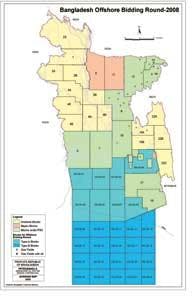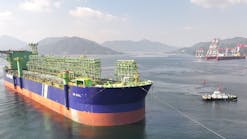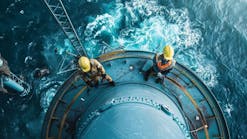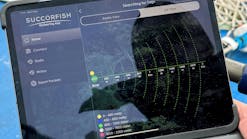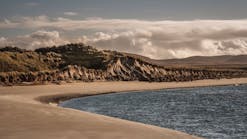Gurdip Singh - Contributing Editor
Bangladesh is set to explore its deepwater basins to source more gas, given the foreseeable end to existing proven, probable, and possible reserves in the country in 2019, based on current estimates.
Jalal Ahmen, Petrobangla chairman
“We need to invest $8 billion on extensive appraisal and development drilling to convert the existing probable and possible reserves into proved reserves of about 20 tcf,” Jalal Ahmed, chairman of Bangladesh Oil, Gas & Minerals Corp. (Petrobangla), tellsOffshore in an interview.
But the next focus would be the 20 deepwater blocks, nine of which are awaiting government decision for awarding to international exploration companies under the next bidding round. Most of the $8 billion immediate investment requirement would come from international oil corporations and the government.
Bangladesh has an estimated 7.7 tcf of remaining proven reserves and 5.5 tcf of probable recoverable reserves.
To keep up with rising demand, the government of the South Asian country seeks to fast-track all of its energy projects, both the offshore field developments and onshore plant installation and pipelines.
Map of lease sale tracts.
An LNG import program is one option to meet future needs, but Jalal believes local deepwater exploration and production is the way forward, especially given strong interest by operators in the hydrocarbon-rich Bay of Bengal.
In 2008, ConocoPhillips bid for eight deepwater blocks and Tullow went for one block, even though these were offered without any seismic data.
Petrobangla has drawn up the 20 new blocks in water depth of 2,000 m (6,562 ft), with an average acreage of 3,300 sq km (1,274 sq mi). Bangladesh’s existing eight shallow water blocks, each covering 6,000 sq km (2,317 sq mi), are in water depth of 200 m (656 ft).
Priority development
Jalal expects Prime Minister Sheikh Hasina Wajed’s government to approve the fast-track projects in the coming months. This would accelerate all planned programs and projects, including the exploration of the nine blocks, if approved by the government, and a series of immediate seismic surveys on the remainder 11 blocks, he says.
Petrobangla will propose to the new government a series of seismic surveys for the remaining blocks, international bids for which would be called later, hopefully this year, Jalal says.
Petrobangla’s subsidiary Bangladesh Petroleum Exploration & Production Co. Ltd. (BAPEX) is largely an onshore operator, and as such most of the offshore prospecting is handled by international oil companies.
“Once the new government approves the pending energy projects, including three compressing plants and pipeline network, we will intensify offshore exploration activities,” he says.
Bangladesh has been under a caretaker government for the past two years and has not been able to implement major projects.
Jalal stressed the importance of the deepwater, pointing out the strong interest in taking up the first nine blocks, which were offered without any seismic data.
He cited Thailand’s PTT Exploration and Production Public Co. Ltd.’s (PTTEP) entry into the Bangladesh gas sector, which had last year taken a 30% farm-in interest in blocks 17 and 18 with France’s Total E&P.
Petrobangla also has worked out a Memorandum of Understanding with PTTEP for working on “mutually beneficial energy projects.”
“We will certainly learn from PTTEP on developing hydrocarbon resources,” Jalal says, highlighting PTTEP’s regional success in upstream sector and expansion plans.
He sees the Petrobangla/PTTEP MoU attracting more regional companies to Bangladesh’s hydrocarbon prospecting sector vis-à-vis Petrobangla’s future expansion both in domestic and regional markets. BAPEX is set to gain from such regional cooperation and ventures, he stresses.
Bangladesh will offer the blocks along the same lines as the 2008 production sharing contract (PSC) model, with nine years for exploration and 25 years for development of a gas discovery with an extension for five years. Though a significant level of oil is yet to be discovered in Bangladesh, the 2008 PSC for oil is for nine years for exploration and 20 years for development with five years of extension. The new PSC offers cost recovery up to 55% of maximum production and profit sharing of 55-75%, depending on daily output tranches.
Promising market
Bangladesh’s domestic market also is ready for more gas and oil and as such any new discovery would be developed at a faster pace than the 25-year period allowed under the PSC. This is because the country has started to see a gas supply shortfall.
By 2025, Bangladesh would be short 26.2 tcf of gas from its 3Ps – proven, probable and possible – reserves. Current production already is below demand, averaging at 1.84 tcf/d against 2.046 tcf/d required by the power sector, fertilizer plants, industries, compressed natural gas outlets, and domestic consumers.
Transmission and distribution network expansion program has been worked out for completion by as early as 2011 for the new gas demand.
Jalal says the future gas infrastructure expansion includes an 850-km (528-mi) pipeline for transporting 1 bcf/d of gas to the local market. The pipeline and three gas compressors are to be completed by 2011 as fast-track projects.
Another 540-km (335-mi) gas pipeline proposal is on the drawing board. This is in addition to the existing 1,995 km (1,240 mi) of pipelines with capacity to supply 2 bcf/d of gas.
Interestingly, the 2008 Bangladesh PSC also has worked out terms and conditions for exploring and developing hydrocarbon resources in cross-border basins through unitization.
Bangladesh has ongoing dialogues with neighbors India and Myanmar, both of which are major hydrocarbon producers from the Indian Ocean. Geological data from that production provides strong confidence to Petrobangla for accelerating deepwater exploration.
“We have a growing domestic gas market and we have the offshore acreage with high potential of hydrocarbon reserves to meet our future energy demand,” says Jalal, aiming to meet the projected 4.6 bcf/d gas demand by 2020.
Chevron gas plan approved
Petrobangla has approved Chevron’s plans to explore for natural gas.
"We have approved the plan to begin exploration activities in hydrocarbon-rich southern Bangladesh which will cost about $55 million," says Jalal Ahmed, chairman of the Petrobangla.
The firm, which supplies almost 40% of the total gas consumed in Bangladesh, plans to conduct a 2D seismic survey at block 7 that covers both onshore and offshore areas including world's largest mangrove forest, Sundarbans. "The seismic survey is essential for determining gas reserves," Jalal says.


